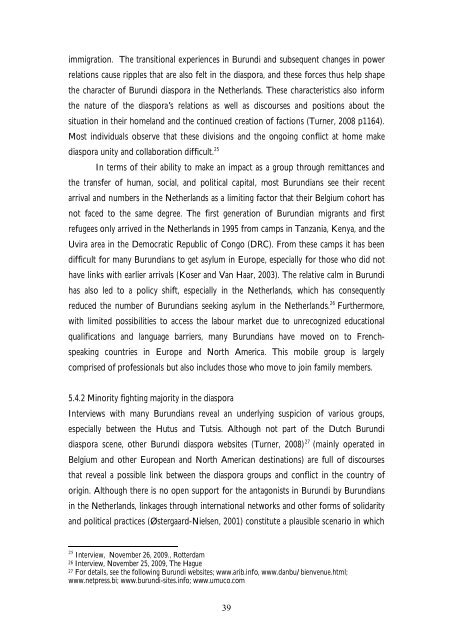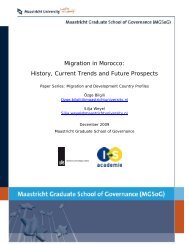Migration in Burundi: History, Current Trends and Future - MGSoG ...
Migration in Burundi: History, Current Trends and Future - MGSoG ...
Migration in Burundi: History, Current Trends and Future - MGSoG ...
Create successful ePaper yourself
Turn your PDF publications into a flip-book with our unique Google optimized e-Paper software.
immigration. The transitional experiences <strong>in</strong> <strong>Burundi</strong> <strong>and</strong> subsequent changes <strong>in</strong> power<br />
relations cause ripples that are also felt <strong>in</strong> the diaspora, <strong>and</strong> these forces thus help shape<br />
the character of <strong>Burundi</strong> diaspora <strong>in</strong> the Netherl<strong>and</strong>s. These characteristics also <strong>in</strong>form<br />
the nature of the diaspora’s relations as well as discourses <strong>and</strong> positions about the<br />
situation <strong>in</strong> their homel<strong>and</strong> <strong>and</strong> the cont<strong>in</strong>ued creation of factions (Turner, 2008 p1164).<br />
Most <strong>in</strong>dividuals observe that these divisions <strong>and</strong> the ongo<strong>in</strong>g conflict at home make<br />
diaspora unity <strong>and</strong> collaboration difficult. 25<br />
In terms of their ability to make an impact as a group through remittances <strong>and</strong><br />
the transfer of human, social, <strong>and</strong> political capital, most <strong>Burundi</strong>ans see their recent<br />
arrival <strong>and</strong> numbers <strong>in</strong> the Netherl<strong>and</strong>s as a limit<strong>in</strong>g factor that their Belgium cohort has<br />
not faced to the same degree. The first generation of <strong>Burundi</strong>an migrants <strong>and</strong> first<br />
refugees only arrived <strong>in</strong> the Netherl<strong>and</strong>s <strong>in</strong> 1995 from camps <strong>in</strong> Tanzania, Kenya, <strong>and</strong> the<br />
Uvira area <strong>in</strong> the Democratic Republic of Congo (DRC). From these camps it has been<br />
difficult for many <strong>Burundi</strong>ans to get asylum <strong>in</strong> Europe, especially for those who did not<br />
have l<strong>in</strong>ks with earlier arrivals (Koser <strong>and</strong> Van Haar, 2003). The relative calm <strong>in</strong> <strong>Burundi</strong><br />
has also led to a policy shift, especially <strong>in</strong> the Netherl<strong>and</strong>s, which has consequently<br />
reduced the number of <strong>Burundi</strong>ans seek<strong>in</strong>g asylum <strong>in</strong> the Netherl<strong>and</strong>s. 26 Furthermore,<br />
with limited possibilities to access the labour market due to unrecognized educational<br />
qualifications <strong>and</strong> language barriers, many <strong>Burundi</strong>ans have moved on to French-<br />
speak<strong>in</strong>g countries <strong>in</strong> Europe <strong>and</strong> North America. This mobile group is largely<br />
comprised of professionals but also <strong>in</strong>cludes those who move to jo<strong>in</strong> family members.<br />
5.4.2 M<strong>in</strong>ority fight<strong>in</strong>g majority <strong>in</strong> the diaspora<br />
Interviews with many <strong>Burundi</strong>ans reveal an underly<strong>in</strong>g suspicion of various groups,<br />
especially between the Hutus <strong>and</strong> Tutsis. Although not part of the Dutch <strong>Burundi</strong><br />
diaspora scene, other <strong>Burundi</strong> diaspora websites (Turner, 2008) 27 (ma<strong>in</strong>ly operated <strong>in</strong><br />
Belgium <strong>and</strong> other European <strong>and</strong> North American dest<strong>in</strong>ations) are full of discourses<br />
that reveal a possible l<strong>in</strong>k between the diaspora groups <strong>and</strong> conflict <strong>in</strong> the country of<br />
orig<strong>in</strong>. Although there is no open support for the antagonists <strong>in</strong> <strong>Burundi</strong> by <strong>Burundi</strong>ans<br />
<strong>in</strong> the Netherl<strong>and</strong>s, l<strong>in</strong>kages through <strong>in</strong>ternational networks <strong>and</strong> other forms of solidarity<br />
<strong>and</strong> political practices (Østergaard-Nielsen, 2001) constitute a plausible scenario <strong>in</strong> which<br />
25 Interview, November 26, 2009., Rotterdam<br />
26 Interview, November 25, 2009, The Hague<br />
27 For details, see the follow<strong>in</strong>g <strong>Burundi</strong> websites; www.arib.<strong>in</strong>fo, www.danbu/bienvenue.html;<br />
www.netpress.bi; www.burundi-sites.<strong>in</strong>fo; www.umuco.com<br />
39



